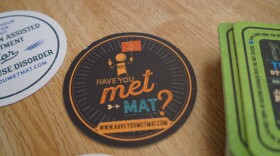It's about 7 o'clock on a Tuesday morning in June and Ashley McAuliffe is getting her 11-year-old son, Aiden, ready for his last day of school.
"We've got about like 10 minutes before we're going to go. So why don't you brush your teeth," McAuliffe suggests.
"Okay," replies Aiden.
"Thanks," she says.
Growing up in Steamboat Springs, McAuliffe started ski racing when she was a kid. This eventually led to freestyle snowboarding, competing in the halfpipe and multiple injuries.
"Broken ankles, broken wrist, broken ribs, dislocations," she said. "So, I was put on prescription painkillers pretty much at age 16 to 18."
When McAuliffe could no longer get Percocet, OxyContin or Hydrocodone from doctors, she started using heroin. Throughout her drug use, McAuliffe had several stints in rehab, but couldn't stay sober. After her second overdose, she decided to try medication-assisted treatment (MAT). MAT combines medications and behavioral therapy to treat substance use disorders.
But two years ago, McAuliffe would not have been able to get MAT in Steamboat Springs.

A block off Lincoln Ave, Steamboat's main street, is a Victorian house built in 1912. The bright yellow building with purple trim is home to Mountain Medical Road to Recovery. It's the first integrated addiction medication and behavioral health clinic providing MAT services in Routt County. Before it opened in 2018, people struggling with opioid use disorder had to travel to Grand Junction or Denver for treatment.
"We came here to try to stop people from dying from overuse of prescribed opiates or from heroin," said Nancy Best, executive director of Road to Recovery.
In 2016, 19 people died of opioid overdoses in Routt County. That's why it and Pueblo County, which also had a high overdose rate, were selected for a new pilot program approved by the state legislature in 2017.
The Medication-assisted Treatment Pilot Program expanded access to MAT to opioid-dependent patients in Routt and Pueblo counties. Over the course of two years, the program provided $500,000 in grants for to community and office-based practices, behavioral health organizations and substance abuse treatment organizations. Three facilities were selected for the grant, including Road to Recovery.
The pilot program, administered by the College of Nursing at the University of Colorado Anschutz, had two goals. The first was to increase access to MAT services and medications which include methadone, buprenorphine and naltrexone.
"Those are either medications that help you to not go into withdrawal and help to rebalance the chemical imbalance in your brain that may happen when you have an opioid use disorder," said Tanya Sorrell, an associate professor at the College of Nursing, who helped oversee the grants.
The second goal was to increase the number of nurse practitioners and physician assistants, who tend to practice in rural areas, according to Sorrell.
The two-year pilot program has been a success. Between the two counties, over 700 people have been treated and 10 additional nurse practitioners and physician assistants received their waivers from the Drug Enforcement Agency to prescribe MAT.
In May, Gov. Polis signed a bill extending the pilot program for two more years. It was expanded to include the San Luis Valley and two other counties that demonstrate a need for MAT services. The funding was increased to $2.5 million.

In April 2018, Best prescribed McAuliffe Suboxone. Suboxone, which is a brand name for buprenorphine/naloxone, is known as a partial opioid agonist. It's a partial opioid and the effect is weaker than full agonists like heroin and methadone. But after using Suboxone for awhile, McAuliffe no longer wanted to take an opioid-based medication.
She decided to switch to Vivitrol, a long-acting injectable form of naltrexone, another MAT medication. Unlike Suboxone, Vivitrol is an antagonist and blocks the opioid receptors in the brain and the euphoric effects of drugs like heroin.
"With Vivitrol, you can't abuse it and it's not an opiate," said McAuliffe. "I just wanted to be 100% clean from all drugs."
But changing medications wasn't easy. Since Vivitrol blocks opioids, a patient needs to be sober for eight days before taking it. The problem: McAuliffe was on Suboxone, a partial opioid. Best did not want her to abruptly stop using that medication, then wait more than a week to get on Vivitrol, and McAuliffe couldn't quickly switch from drug to the other.
"Suboxone is a partial opioid agonist, meaning it's sitting on that receptor," Best said. "If I give her naltrexone or a Vivitrol shot, it's going to kick that off the receptor and she's going to be sicker than she ever has been."
So Best, who is a physician assistant and certified addiction counselor, got creative. She cross tapered two medications over eight days, decreasing the Suboxone while increasing the oral Naltrexone dosage. Then McAuliffe was able to get a Vivitrol shot.
"I was honest. I just told Ashley (McAuliffe) you're going to be the first one."
Best's experiment worked and McAuliffe received her first Vivitrol shot in December 2018. Since then, she gets the injection every 28 days.
Vivitrol and Naltrexone are approved by the Food and Drug Administration to treat opioid use disorders and alcohol use disorders. But over a year ago, Best started using the medication to treat another type of drug addiction: methamphetamine.

During the spring of 2018, Melinda McDowell spent her days on her bathroom floor, smoking crystal meth.
"I was tweaking pretty hard. I was hallucinating so bad," she said.
Her husband was away in Japan and her two youngest kids had been taken into foster care due to her heavy drug use, which had spanned more than two decades. One day, McDowell looked in a mirror and decided to quit.
"I knew I looked like crap and I knew that I had to stop, otherwise I was going to die," she said.
A friend, who McDowell met in a recovery program, had given her the number for Road to Recovery. McDowell said she called Best, begging for help.
Best had never prescribed a MAT medication for methamphetamine addiction before but knew research on the effects of naltrexone and Vivitrol existed. The first drug had shown more positive results than the second.
So Best initially prescribed naltrexone. She said McDowell called within an hour of taking the medication and was ecstatic.
"Sure enough it just, my body started relaxing," McDowell said, "I started feeling relief and the withdrawal and the cravings were going away."
But naltrexone is a daily pill and Best wasn't sure if McDowell could maintain the strict schedule. So, she put McDowell on Vivitrol too. She's been taking both medications for over a year.
"It's a miracle. It's a miracle. Um, I should not be sitting here today. I should be dead, but Nancy literally saved my life," McDowell said.
McDowell, 45, is getting her life back together. She's filed an appeal to regain custody of her kids and is studying to become a certified addiction counselor. McDowell goes to regular group meetings and counseling sessions at Road to Recovery. She has developed a sober support network.
"We've got our awesome community of people that we're just so tight and close," McDowell said. "I've referred people who've referred people, who've referred people."
But despite the success of Road to Recovery and the MAT program, McDowell said some people in the recovery community believe in abstinence only. Using medication, she said, comes with a stigma.
"A lot of the people at the NA (Narcotics Anonymous) groups, they looked down upon us because they say, 'Oh, well you're still taking legal drugs,'" said McDowell. "But this is non-addictive. It can't get you high. The only thing it does is give you, it's like a crutch. It helps you stay sober. I mean I don't understand why people just don't get it."
McDowell has struggled with addiction for over 30 years. She said, if necessary, she'll take naltrexone and Vivitrol for the rest of her life.
Since treating McDowelll, Best has prescribed the medications to treat other patients dealing with methamphetamine and alcohol addictions.

About three miles from Road to Recovery, McAuliffe cuts a large submarine sandwich into smaller pieces to be individually wrapped and sold. She's a manager at an upscale grocery store at the base of the ski mountain.
"I feel great overall. Just working hard, exercising hard, you know," McAuliffe said. "More available for my kiddo."
Like McDowell, she's also finishing up a program to become a certified addiction counselor. McAuliffe wants to help others who struggle with substance use disorders. But she remains focused on her own sobriety.
"I always have that fear of relapse," McAuliffe said. "I think I'm going to stay on Vivitrol for a year to two years and that's a good safety net for me."
Editor's note: This story has been updated to correct which two medications Nancy Best cross tapered Ashley McAuliffe between.





